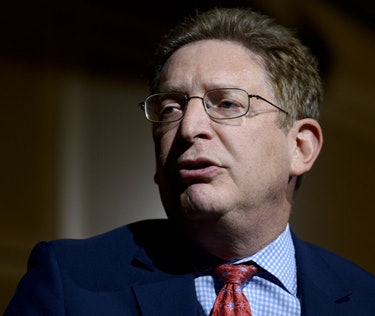WASHINGTON — The American Association of University Professors, with the help of the Newseum Institute, held a symposium where two groups of panelists were asked whether they believe freedom of speech and the press is in a crisis and is being threatened.
John Wilson, co-editor of AAUP’s Academe Blog, summarized the prevailing sentiment at the event, saying, “The fact is free speech has always been in crisis.”
 Newseum CEO Jeffrey Herbst
Newseum CEO Jeffrey HerbstGene Policinski, chief operating officer at the Newseum, served as the moderator on the first panel of experts comprised of Wilson; Jeffrey Herbst, Newseum CEO and former president of Colgate University; and Catherine Ross, professor of law at George Washington University.
Ross, honing in on freedom of political speech in higher education, said administrators need to allow offensive and hateful speech, even if they don’t agree with it. “The First Amendment protects even intentional hate speech,” she said.
When discussing a teacher’s role in educating students, Ross added, “Whether K-12 or college you cannot tell a court ‘OK, I silenced speech, but I did it to protect someone else from hurt feelings.’”
Wilson went on to say that administrators hold the power of maintaining freedom of speech, not the students. He explained that those with money or power have the ability to — and often do — influence colleges and universities and the speakers or lecturers that school administrators invite to campus.
Wilson then spoke out against the idea that millennials deserve the title ‘snowflakes’ they so often receive on campuses across the nation for fighting hateful speech. “Those darn kids are not destroying free speech in America,” he said.
Herbst pointed out, in response to a question from the moderator, “It’s not an issue, as big as it is, that colleges and universities can address by themselves. It’s a societal issue.”
In the second panel on freedom of the press on college campuses, Frank LaMonte, executive director of the Student Press Law Center; Hank Reichman, vice president of AAUP; and Courtney Rozen, editor-in-chief of The Eagle at American University, tackled questions from Policinski.
Reichman first agreed with Wilson’s assessment, then went further by saying, “The crisis of the student media is, I think, significantly worse than it has been in other times.”
To buttress his point, he quoted the Joint Statement on Rights and Freedoms of Students, drafted and approved by AAUP almost 50 years ago in comparison to today’s climate: “Student publications and the student press are valuable aids in establishing and maintaining an atmosphere of free and responsible discussion and of intellectual exploration on the campus.”
LaMonte spoke out on administrators shutting down students’ freedom of speech. He referred to a recent ruling by the Minnesota Supreme Court that supported the action against Central Lakes Community College nursing student Craig Keefe. The student vented his anger with a fellow classmate on Facebook and was expelled as a result.
LaMonte claims this restricts students’ speech, citing the law, if an offender “steps outside the boundaries of accepted professional standards,” he or she is no longer protected by the First Amendment on a public college campus.
LaMonte cited the ruling as an example of the government overstepping its authority and used it as a segue into his discontent with many colleges claiming the right to prohibit students from standing alone for interviews with either campus or other newspapers and media outlets.
Rozen then recounted the experience of one of her predecessors as editor with the “gag rule” for athletes at American University. As a swim team member, a reporter could not interview her own teammates and peers without the presence of the coach or athletic director.
At the end of the event, the panelists agreed that significant advancement is needed in order to protect freedom of speech and press on campuses.



















